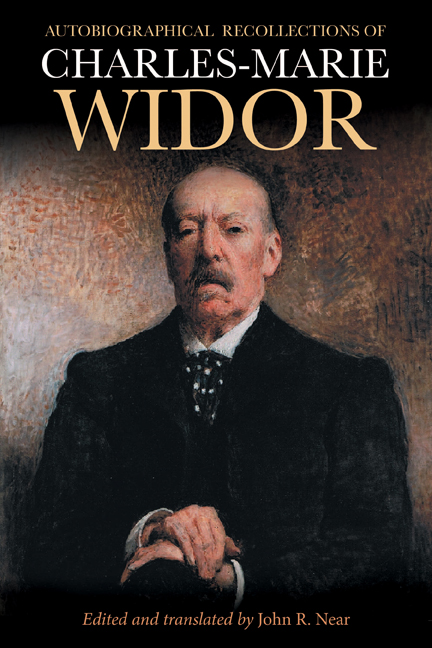Book contents
- Frontmatter
- Contents
- List of Illustrations
- Foreword
- Preface
- Acknowledgments
- Introduction: Tribute to Charles-Marie Widor
- Part One Studies, Early Performances, and Aristide Cavaillé-Coll (1844–69)
- Part Two La Belle Époque: The Franco-Prussian War to The Great War (1870–1914)
- Part Three The Great War and Important Initiatives (1914–37)
- Appendix 1 Birth record of Charles-Marie Widor, 1844
- Appendix 2 Widor’s Diplôme de Bachelier ès Lettres, 1863
- Appendix 3 Widor’s letter of appreciation to Jacques Lemmens, 1863
- Appendix 4 Brussels Ducal Palace organ specification, 1861
- Appendix 5 Widor’s certificate for Chevalier de l’Ordre du Christ, 1866
- Appendix 6 “To Budapest,” 1893
- Appendix 7 Widor’s travels to Russia and his 1903 passport
- Appendix 8 Widor’s list of his works in 1894
- Appendix 9 The Paris Conservatory organs, 1872
- Appendix 10 Chronique [Widor’s appeal for an organ hall at the Paris Conservatory, 1895]
- Appendix 11 Widor’s certificate for the Académie Royale, Brussels, 1908
- Appendix 12 “Debussy & Rodin,” 1927
- Appendix 13 The American Conservatory organ, Fontainebleau, 1925
- Appendix 14 Letters concerning the Trocadéro organ restoration, 1926
- Notes
- Bibliography
- Index
- Eastman Studies in Music
42 - 1919: Strasbourg, the Sinfonia sacra, Symphonie antique, and ancient themes
Published online by Cambridge University Press: 09 May 2024
- Frontmatter
- Contents
- List of Illustrations
- Foreword
- Preface
- Acknowledgments
- Introduction: Tribute to Charles-Marie Widor
- Part One Studies, Early Performances, and Aristide Cavaillé-Coll (1844–69)
- Part Two La Belle Époque: The Franco-Prussian War to The Great War (1870–1914)
- Part Three The Great War and Important Initiatives (1914–37)
- Appendix 1 Birth record of Charles-Marie Widor, 1844
- Appendix 2 Widor’s Diplôme de Bachelier ès Lettres, 1863
- Appendix 3 Widor’s letter of appreciation to Jacques Lemmens, 1863
- Appendix 4 Brussels Ducal Palace organ specification, 1861
- Appendix 5 Widor’s certificate for Chevalier de l’Ordre du Christ, 1866
- Appendix 6 “To Budapest,” 1893
- Appendix 7 Widor’s travels to Russia and his 1903 passport
- Appendix 8 Widor’s list of his works in 1894
- Appendix 9 The Paris Conservatory organs, 1872
- Appendix 10 Chronique [Widor’s appeal for an organ hall at the Paris Conservatory, 1895]
- Appendix 11 Widor’s certificate for the Académie Royale, Brussels, 1908
- Appendix 12 “Debussy & Rodin,” 1927
- Appendix 13 The American Conservatory organ, Fontainebleau, 1925
- Appendix 14 Letters concerning the Trocadéro organ restoration, 1926
- Notes
- Bibliography
- Index
- Eastman Studies in Music
Summary
After the war, I went to Strasbourg to participate in the first French concert given again in the Palais des Fêtes [Sängerhaus]—the same hall where I had inaugurated the organ before the war with my Sinfonia sacra [op. 81] and that I re-inaugurated in a way with my Symphonie antique [op. 83], a work built on the admirable themes of the Te Deum and Lauda Sion.
Why is it that French organists with a talent for composition do not use more of these old legendary themes? For five centuries, the first Christian bishops carefully sorted out what were the most characteristic of the ancient (Greek) chants. Who were the authors of these melodies? No one can say. One of the most beautiful cries that has ever come from a human chest is the intonation of the Te Deum. Whose is it? Once heard, it cannot be forgotten. A legend has wanted it to be by the greatest poet of all time and has attributed it to Sophocles on the eve of Salamis. He was twenty-one years old, a citharist, chorus master, and lyric poet. Inundated by the horde of Persians ten times more numerous than the Greek army, and stunned by the victory, he would thus have sung: do mi sol la la la sol … exhaling his soul in this sublime cry that belongs to two modes at the same time in the same tonality. What is true about this? We cannot say.
I questioned my colleagues from the Inscriptions et Belles-Lettres on this subject, and their opinion is that the composition of the words of the Te Deum should rather be attributed to another legend, which would give the authorship to Saint Ambrose or Saint Augustine. The same literary text is said to be the work of a fourth-century bishop living on the banks of the Danube, in Teresina, today Nea Palanqua.
What a misfortune for humanity! We have nothing in Saint Augustine's works announcing a music treatise De musica for the good reason that he never wrote it, despite his advertisement for this work. The only treatise we have is one on the prosody of verse. How is it that we have nothing of the popular hymns from Athens, Rome, Egypt, Palestine, or Babylon? At the Louvre Museum we have almost all the old instruments, but no texts.
- Type
- Chapter
- Information
- Publisher: Boydell & BrewerPrint publication year: 2024



